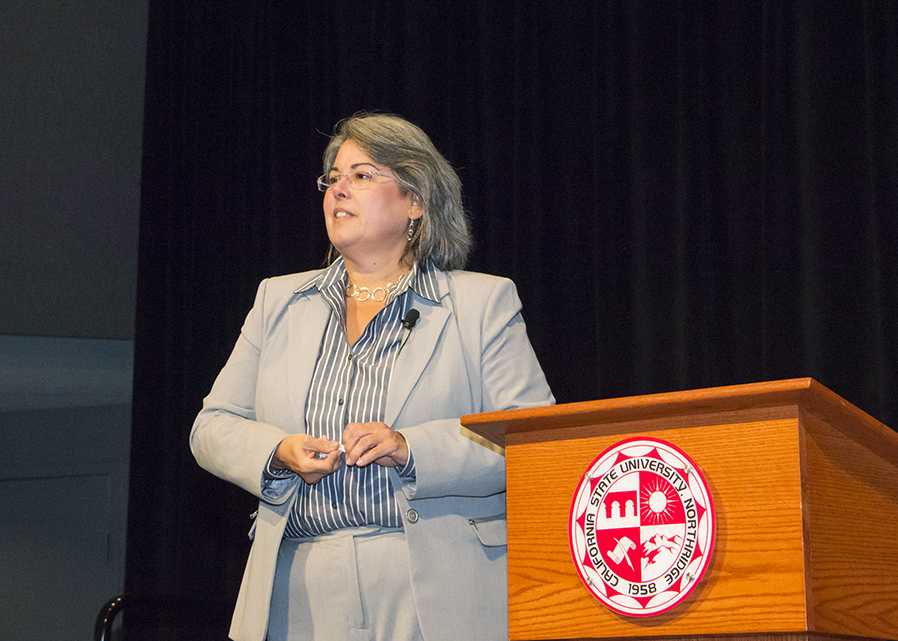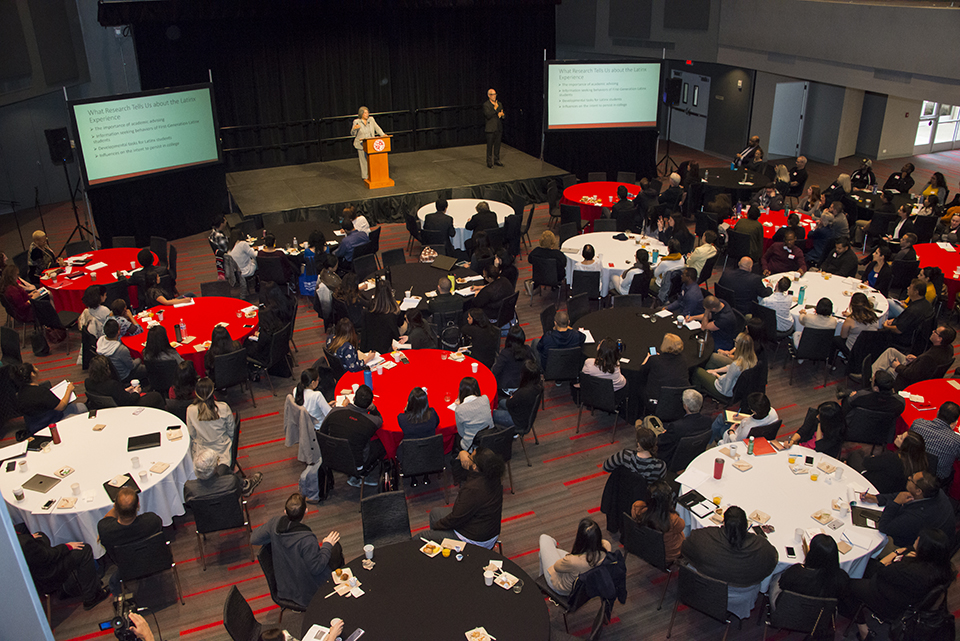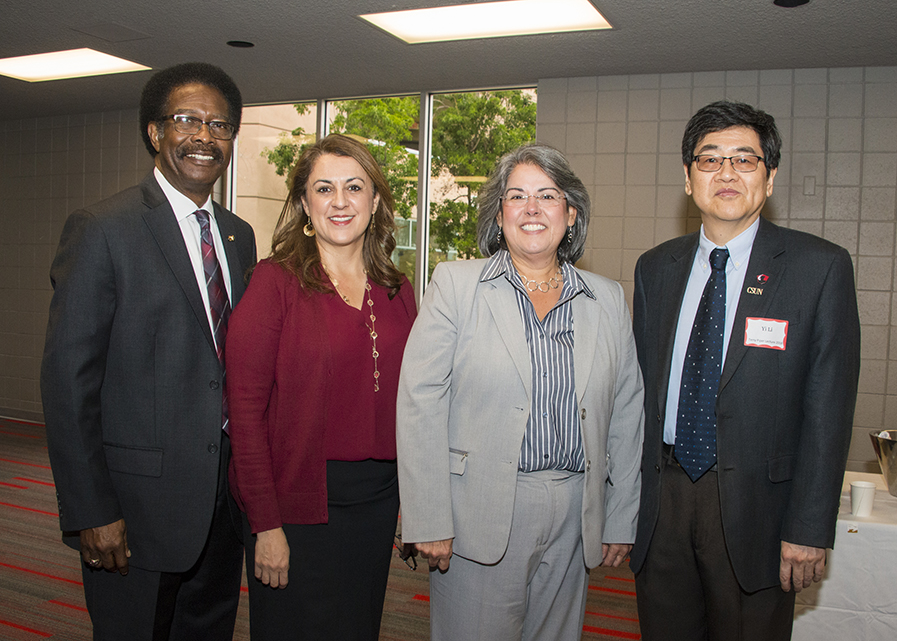Terry Piper Lecturer Shows How CSUN Can Enhance Latina/o Student Success
A key question in the college careers of many first-generation Latina/o students is this: How do I incorporate cultural and family expectations with the life I have chosen?
Vasti Torres, a nationally recognized professor of Latina/o studies at the University of Michigan, has spent much of her career researching that question, talking to Latina/o students about the factors that aid and hinder their success in higher education. She found that nearly all families of first-generation students want them to succeed and create new opportunities for themselves, but students often struggled to communicate the demands of a successful college career.
“People would talk about what their parents wanted versus what they wanted,” said Torres, who shared research and strategies for enhancing Latina/o students’ success at California State University, Northridge’s seventh annual Terry Piper Lecture on April 2. “[Many students would say], ‘My parents don’t understand that I can’t work on Saturdays because I need to spend this Saturday in the library doing a paper. Or, my parents don’t understand that I can’t work 40 hours per week.’
“They felt if they let their parents down, they were being untrue to their culture,” Torres continued. “Students on their own think, ‘I either let them down or I please them.’ We have to help [students] learn how to manage that and how to engage in a conversation with their parents.”
In her CSUN lecture, Torres said universities must create a campus environment that accounts for Latina/o students’ identities to help them flourish. She offered insights and suggestions to enhance the success of Latina/o students, which make up 46 percent of CSUN’s student population.
Torres is a professor in the Center for the Study of Higher and Postsecondary Education and an associate faculty member in Latina/o studies at Michigan. Her research includes a multi-year grant investigating the choice to stay in college for Latina/o students, as well as a multi-year grant looking at the experiences of working college students. These areas are especially relevant to CSUN in light of its Matadors Rising student success initiative, which aims to boost graduation and retention rates.
CSUN ranks 16th in the country in awarding bachelor’s degrees to underrepresented minority students and fifth nationally in awarding master’s degrees to Latina/o students.
“Really take heart that you are doing good work — you’re nationally recognized for doing good work in this area,” Torres said. “But it’s a never-ending battle. I want you to continue, because you are serving the next generation of students.”
In her speech, Torres frequently referred to data she collected at Indiana University, when her graduate research assistant was CSUN alumna Ebelia Hernandez ’05 (M.S., Counseling), who is now an associate professor in the College Student Affairs program at Rutgers University.
The more a student interacts with an adviser, the more likely that student is to succeed, Torres noted. But students who are most at risk of dropping out are also least likely to meet with or trust an adviser. Latina/o students are even less likely to implicitly trust campus authority figures, Torres said — partly because a student might ask two different advisers variations on the same question, and get two different answers. To combat this, Torres said, advisers need to understand that students do not always ask the right question, and advisers must work to help students understand everything they need to know about a situation.
Advisers should work to eliminate many of the factors that cause students to doubt they can succeed, Torres said. For example, if a student wants to drop a class, the professor and adviser should assume there is an underlying cause and investigate by engaging the student, to determine whether the concern can be mitigated.
“Proactive advising is most effective with underserved students, and holistic advising,” Torres said. “Holistic advising is this notion that you’re not just talking about information — ‘these are the courses that you need to take, this is why you need to take them’ — but [you’re also asking], ‘how are you doing, what is it you want to do, how is your family, how is your work situation influencing your course-taking activity?’ This is holistic advising. It’s this notion of an entire person, a whole person.”
Torres also offered constructive criticism on ways CSUN could reinforce its standing as a place where Latina/o and other minority students can succeed, including taking more steps to publicize its designations as a Hispanic-Serving Institution and an Asian-American- and Native American Pacific Islander-Serving Institution.
The annual lecture is named in honor of Terry Piper, who served as vice president for student affairs at CSUN for nearly 10 years. He is credited with reshaping CSUN’s Division of Student Affairs to align with the most current practices supporting student learning and success. Piper passed away in May 2010. He was remembered at the lecture as an inspirational and even disruptive force who challenged his colleagues to think about every choice in terms of making a positive difference for student success.
“The university exists to place students at the center of what it is that we’re all about,” said Vice President for Student Affairs and Dean of Students William Watkins. “We really should be thinking about the choices and decisions that we make in terms of how we contribute to getting students to achieve their goals.”
Watkins and Provost Yi Li each spoke about the importance of fostering a sense of belonging among students, which positively impacts performance and the desire to finish a degree. Each interaction on campus — with faculty, staff or fellow students — is an opportunity to reinforce that a student belongs.
“We are here to help provide a transformative experience,” Li said.
CSUN’s efforts to retain first-time freshmen are already paying off. Li noted that retention of first-time freshmen has reached a record 81 percent.
“We’re going to continue to push forward,” Li said. “We welcome students from all walks of life, from all different circumstances and from all learning backgrounds. We also want CSUN to be known nationally, to be the place where students come and graduate and move on to have a successful career, a life and to be a great civic leader.”




 experience
experience